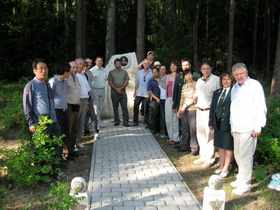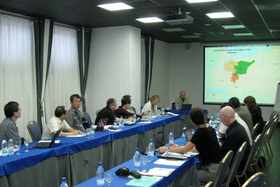«Traffic light» controls pristine forests both in Komi and Argentina
Director of the Silver Taiga Foundation Przemyslaw Majewski took part in the 13th meeting of the Montreal Process Advisory Committee, which started on the 2d of July in the UN office in Moscow and continued in Suzdal, Vladimir region.
The Montreal Process is an international intergovernmental initiative formed in 1994 for the purpose of harmonization and adoption of criteria and indicators of sustainable management for boreal and temperate forests. The Process Working Group consists of 12 countries: Argentina, Australia, Canada, Chile, China, Japan, Korea, Mexico, New Zealand, the Russian Federation, the United States, and Uruguay. These 12 countries are responsible for 83% of the world’s temperate and boreal forest (further details about the Montreal Process can be found at website www.mpci.org).
The meeting in Suzdal was devoted to perfection of the criteria and indicators related to soil and water protection. Participants from China, New Zealand, Australia, Argentina, South Korea, Japan, and Russia, as well as representatives of international organizations, such as FAO* and World bank, listened to the reports of the represented countries and suggested some options of possible changes in the criteria and indicators.
The second objective of the meeting was discussion of the criteria dissemination and promotion among the foresters.
It will be recalled that Model forest in Komi is connected to the Montreal Process. At the very beginning of the Model forest idea implementation here in 1997 and 1998 within the framework of this project the partners were searching for the criteria of sustainable forest management, which would facilitate the progress in this direction and simultaneously would be recognizable by the Russian authorities. Having chosen the criteria of the Montreal Process it was analyzed to which extent the forest management in Komi existing in those times complied with them. Gaps between the criteria and reality were afterwards used as a basis for activities of the Komi Model Forest. During the meeting in Suzdal.
Przemyslaw Majewski presented an experience of the Komi Model Forest in conservation of soils. In a separate presentation he made the first conclusions on the taiga rivers management issues, based on the brief experience of the Model River Mezen project. Regional experience from Komi was rated by the organizers as a necessary view from a province, which is so often lacking, because this is an availability of the connection between the international and national (state) criteria and local experience, which is considered to be an important basis for efficiency of the adopted criteria. In both presentations of the Silver Taiga Foundation real challenges for management were presented and potential areas for improvement of the situation were suggested.
Reports of the participants from other countries showed that many efforts are made in China, Australia, Japan, and South Korea for conservation of soil and water resources. Interesting reports containing the information about the progress made in different countries with real examples turned out to be the most attractive aspect of the conference. They also helped to make a conclusion that different countries have similar problems, such as, low level of information exchange between the agencies, insufficient interaction between the participants of the forest relations, and limited participation of the society in this process.

Participants of the meeting during the field excursion near the monument to the outstanding forester
Vladimir region, July 3, 2012
An advantage of the Montreal Process is the fact that the criteria of sustainable forest management developed within the framework of this initiative are approved on the state level. This means that there is a primary basic list of criteria, which everybody can refer to. Even on this basis much can be done for the well-being of forests avoiding the accusations of voluntaristic approach towards the question of what is sustainable and what is not.
On the other hand, these criteria are quite general. Countries-participants are obliged to report on compliance with them, but at the same time no severe consequences in case of lack of progress in the forest management are foreseen. Criteria are not working by themselves, automatically. They do not answer the question how to achieve the new quality of management. Adaptation of the criteria and introduction of the new approaches to the forest management stay on the national (federal) and regional levels.
Probably, it would be also interesting for the readers from Komi to know that description of the forest massifs value using the traffic light principle (red – for protection, yellow – reduced impact logging, green – regular logging), which was successfully adopted and is under implementation in Komi, turned out to be used on a large scale also in Argentina on the territory of 48 mln ha. Surprisingly, during the period of development of this approach in both countries there were no contacts between Komi and Argentina. However, in both countries “traffic light” helped to find compromises and provided the society with the information justifying the upcoming choice in plain language understandable to everybody.
Przemyslaw Majewski
Valentina Semyashkina
Translated by Irina Sokolova

